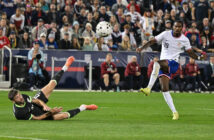There is no greater day in US football history than 29th June, 1950. On that day at the Estádio Independência in Belo Horizonte, a team of eleven men representing the United States of America beat England 1-0 in the World Cup.

Photo: LFChistory.net
The ‘Miracle on Grass’ as it later came to be called marked the biggest humiliation too in England’s national football history.
The USA had lost their last seven international matches by the combined score of 45–2.
This was three years before the Magnificent Magyars of Hungary arrived at Wembley and gave England their famous ‘Ferenc Puskas inspired’ football lesson in a 6-3 win; a result widely credited for lifting England’s dismissive attitude towards the rest of world football.
England had the legendary Stanley Matthews in their squad and considered themselves the best in the world, although unlike their same view today, without copious evidence to the contrary.
Out of over confidence, Matthews and a few other regulars were not even selected. One man who did play was Laurie Hughes who died this week aged 87.
Hughes was a stalwart of the Liverpool defence in the 50s, helping Liverpool to lift the first post-war League Championship in 1947.
He started his career where he was born, on Merseyside, with Tranmere Rovers before making the hop across the Mersey to sign for the Reds.
After playing in the FA Cup Final of 1950, a 2-0 loss to Arsenal, he was selected to England’s World Cup squad for the finals in Brazil after Neil Franklin was suspended for playing in Colombia, then outside the FIFA family.
He made his England debut in the first game a 2-0 win over Chile alongside England captain Billy Wright at centre half.
Four days later, they faced an American side consisting of a high school teacher, a hearse driver, funeral parlor, postmen and dish washers.
As history now recalls, Joe Gaetjens scored the only goal with a diving header in the 37th minute and so was born one of world football’s greatest shocks.
So unexpected was the result, that many newspapers assumed a typographical error on the telegraph and reported that England had won 10-0.
It was 60 years before the sides met in the World Cup again, a 1-1 draw in Germany.
Hughes was selected for England’s next game which they lost 1-0 to Spain. He never played for England again.
His international career lasted eight days and saw England eliminated from their first World Cup finals at the first hurdle.
![Prost International [PINT]](https://prostinternational.com/wp-content/uploads/2021/08/PINTtFontLogoRoboto1536x78.jpg)


